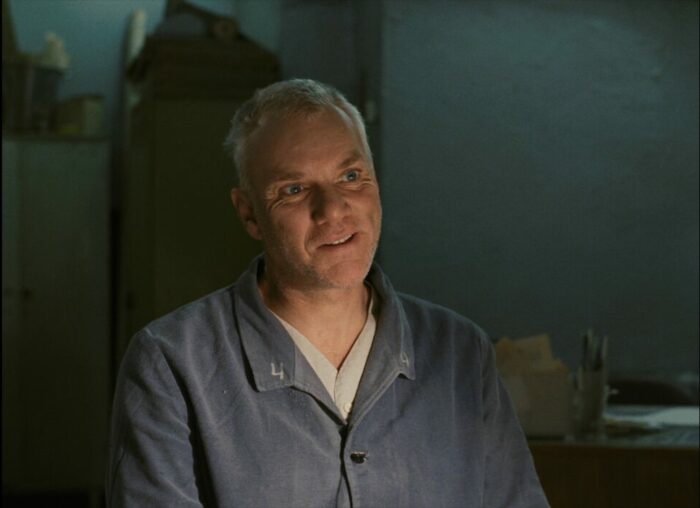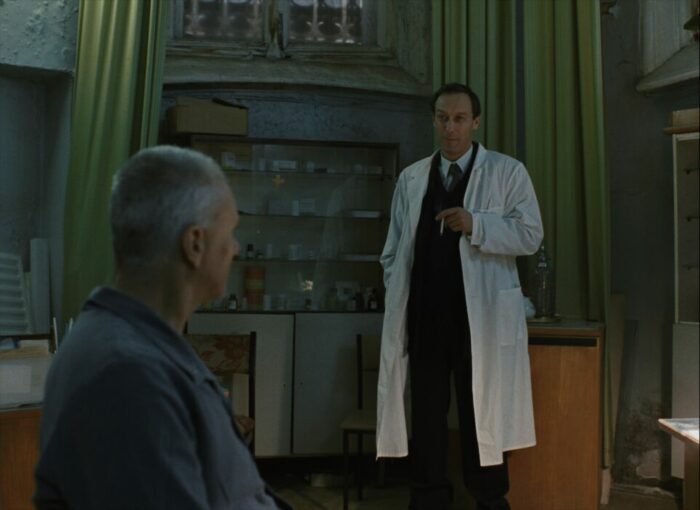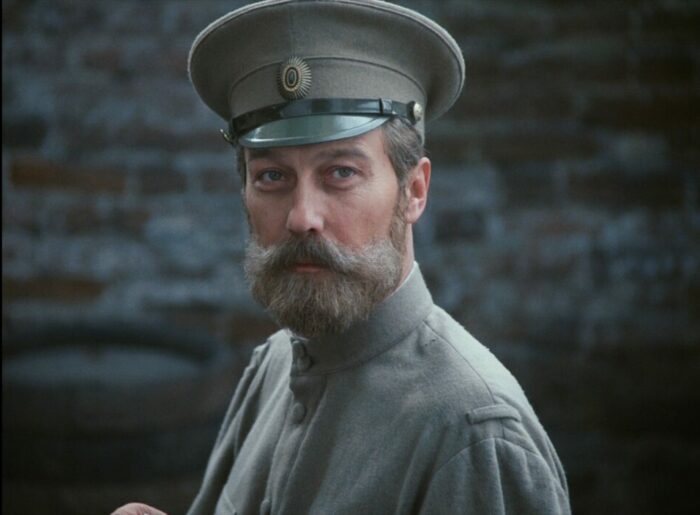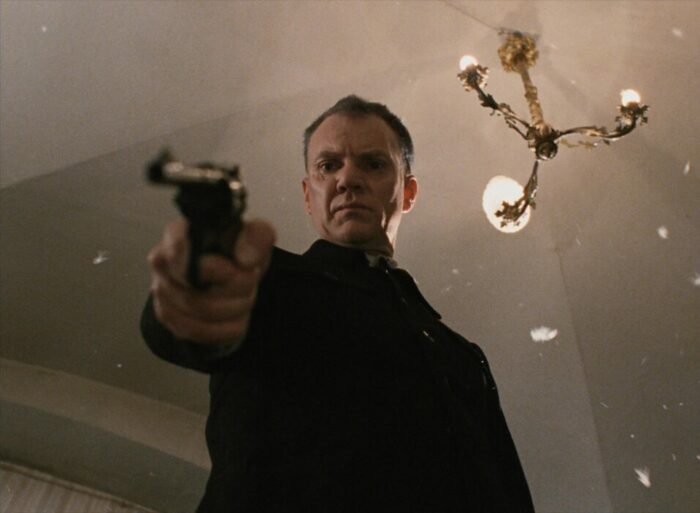For a time following Gorbachev, glasnost, and the dissolution of the Soviet Union—and well before Russia’s current war on Ukraine—international co-productions between Russian studios and those in the West were not at all unheard of. Nearly unimaginable today, in 1991 Mosfilm Studios President Karen Shakhnazarov’s The Assassin of the Tsar (Цареубийца) was one of those, a co-production between Russia and the U.K. starring Malcolm McDowell as the central figure in a speculative historical fiction. More than a mere time-travel time-capsule, The Assassin of the Tsar is a compelling, thought-provoking insight on Russia’s past, then-present, and future, led by convincing performances from its two leads, McDowell and Russian actor Oleg Yankovskiy.
The film has been newly remastered and rereleased by the U.S. company Deaf Crocodile in association with partner Seagull Films. The re-release features 2K restorations of both versions of the film on separate 35mm negatives: an English-language version in which the Russian actors are dubbed, and a Russian-language version in which McDowell is dubbed. The film was inspired by Shakhnazarov’s plans to adapt Anton Chekhov’s 1892 novella Ward No. 6, research for which took him to Soviet mental hospitals. When that project was abandoned—Shakhnazarov would return to it nearly two decades later—he and co-writer Aleksandr Borodyanskiy drafted their own story of a patient in a Russian asylum haunted by ghosts from the past.

Cannily, their protagonist, as played by McDowell, would serve as a synecdoche for Russia’s collective psychological struggle to cope with its conflicted, violent past. McDowell’s Timofeyev is a severe schizophrenic serving time in a dreary Soviet mental hospital. Mysteriously, the mark of a rope burn appears temporarily across his neck on the anniversary of the Tsar’s execution, and he comes to believe he is, improbably, the killer of two Tsars: both Alexander II in 1881 and his grandson Nicholas II in 1918. Suffice it to say, Timofeyev’s is a complex case, and the hospital’s chief doctor, Smirnov (Yankovskiy) attempts an ahead-of-its-time therapy: a cognitive-behavioral approach to roleplay. If Timoyev believes himself to be killer of the Tsar, Smirnov will himself play the role of the Tsar in an attempt to cure the delusional patient.

As the two men’s interactions continue, with Smirnov more and more determined to cure Timofeyev of his madness, Shakhnazarov takes them back in time to those days leading up to the 1918 assassination of Nicholas II. In these scenes, McDowell now plays Yakov Yurovsky, the chief guard and ultimate executioner of the Romanov family, and Yankovskiy the Tsar himself, in impressively mounted scenes with rigorous period detail. Russia’s present and past intertwine as the two protagonists warily exchange words in the modern-day asylum and Yurovsky diligently plans the Tsar’s execution in the long-ago past.

One of these plots, of course, is a foregone conclusion. Though the rumors of an escaped princess, the daughter Anastasia, and dozens of imposters captured the public imagination in tabloids and film throughout the 20th century, there were no Romanov survivors of the execution in real life. The Assassination of the Tsar is blunt and explicit in these facts, as bleak as a Siberian winter even as it allows for the smallest ray of hope that a young girl might somehow have escaped and survived. As for the present-day patient Timofeyev and his doctor Smirnov, the two find themselves inhabiting the ghosts of their—and their country’s—pasts, unable to change or come to grips with history’s outcome.

The assassin of Tsar Nicholas II was for decades a banned topic in the Soviet Union. Though films like Anastasia (1956) and Nicholas and Alexandra (1971) had been made in the West, no Russian film before The Assassin of the Tsar broached the topic. The subject “was banned absolutely, and we knew very little about it. Any materials concerning this matter only began to appear only at the end of the perestroika period,” recalls director and co-writer Shakhnazarov. “When I read those materials, articles, books, I was fascinated by the story. The formerly closed archives were open and accessible … Of course, the story of the assassination of the royal family is very dramatic, it’s a tragedy, and a very complex subject.”
That complexity is matched by the intensity of The Assassin of The Tsar‘s two leads. McDowell could always play unhinged well, though his performance here is more subdued than one sees in If … or A Clockwork Orange. His gentle, even at times obsequious demeanor in the present contrasts with the steely will his executioner-of-the-past evidences. Yankovskiy conveys a sympathetic, determined intelligence as Doctor Smirnov, but is also a convincing Tsar Nicholas. (On a historical note, Yankovsky died in 2009, just three days after his last film—Tsar, in which he played the role of Metropolitan Philip—premiered at Cannes.)
The film’s new transfer is excellent in its detail. Unsurprisingly, the elaborate costumes and architecture of the Romanov era benefit most from the remastering: the gilded décor and bedecked costumes nearly pop off the screen in comparison to the dark dirge of the scenes set in modern asylum. No matter which version of the film you watch, you will have to suffer some dubbed language spoken. McDowell spoke English, the other actors Russian. The result, at least in the English-language version, is some oddly-clipped phrasings and intonations.
More than a decade ago, in his role as president of Mosfilm, and in an attempt to promote cross-cultural relations between Russia and the West, Shakhnazarov made hundreds of Russian films, all subtitled in English, including many he’d directed of his own, freely available on YouTube. One of his, American Daughter (Американская дочка, 1995), was even shot in the United States. The films available include crisp versions of classics like Larisa Shepitko’s The Ascent, Elem Klimov’s Come and See, and many more, from Potemkin to By the White Sea. It’s an extraordinary trove of free content.
To make the purchase of physical media worthwhile, Deaf Crocodile and Seagull Films promise an array of special features for their upcoming Blu-ray release of the The Assassin of the Tsar. Both actor Malcolm McDowell and director-writer Karen Shakhnazarov will be featured in separate, newly-recorded interviews. Prolific film historian and critic Samm Deighan provides an audio commentary track, and the package also features a booklet insert with a new essay on the film by critic Walter Chaw.
Today, such the kind of cross-cultural collaboration that marked Shakhnazarov’s film seems unimaginable: Vladimir Putin’s Slavophile doctrine of anti-Westernism informs, to at least some degree, his Russia’s invasion of Ukraine, but The Assassin of the Tsar was at its time a film informed by Gorbachev’s glasnost, a film that was made with the explicit intention of opening up the country’s psychology to the Western world. And as such, it continues, even today, to enthrall.
Deaf Crocodile and Seagull Films present the Blu-ray release of The Assassin of the Star, available for purchase directly from Vinegar Syndrome, including the following:
- New 2K restoration of the English language version of the film (104 min.).
- New 2K restoration of the Russian language version of the film, featuring a slightly different cut and different music (102 min.).
- New hour-long video interview with lead actor Malcolm McDowell, moderated by Dennis Bartok of Deaf Crocodile Films.
- New hour-long video interview with director/co-writer Karen Shakhnazarov, moderated by Dennis Bartok.
- New commentary track by film historian Samm Deighan.
- New essay by film critic Walter Chaw (Film Freak Central).
- Blu-ray authoring by David Mackenzie of Fidelity In Motion.




